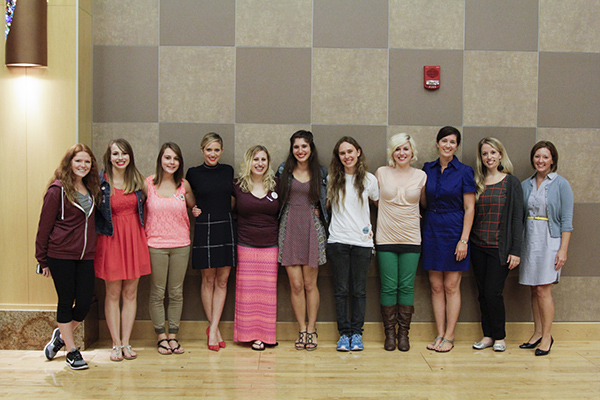
Body Sense members and CSS counselors with Brittany Snow after bringing her in to speak about self-love through a collaboration with OUAB. Credit: Courtesy of OUAB
Hayley Esterline sat in a circle of Ohio State students, attendees of a Body Sense meeting, in the spring of 2014. Each person was asked to produce an “I am” statement, a positive declaration about the self, such as, “I am smart,” or “I am beautiful.”
Esterline described the moment in which she spoke as being powerful and said, “That was probably the first time freshman year I’d said something nice about myself.”
Esterline, a third-year in psychology and women’s gender and sexuality studies, and Laurie Hamame, a fourth-year in journalism, are now co-presidents of Body Sense, a campus organization that advocates for self-love. Hamame said Body Sense “fights the consequences of negative body image,” such as the stigma associated with eating disorders, and the student organization donates funds to various body-positive organizations.
Hamame said that the group tries to discuss body image and body positivity, and it hosts activities in new ways every other Wednesday in room 220 in the Younkin Success Center.
“You can talk about body image over and over and over, but it’s not going to make a difference unless you present it in a way no one’s ever heard it before,” Hamame said.
Among the activities Body Sense has organized in the past are actress Brittany Snow’s visit to campus as a guest speaker and the annual spring National Eating Disorder Association Walk, which will be held April 16 this year.
Esterline estimated that last year’s NEDA Walk had at least 100 participants and raised more than $14,000. This year, they hope to raise $20,000, which might be more reachable thanks to an increase in recognition after Snow’s campus visit, she said.
“This year, especially, I feel like our group has kind of blown up more,” Hamame said. “People recognize us.”
Hamame said she can’t imagine her life without Body Sense, which acts as a kind of support group where she can escape the stigma of mental health to “an entire room full of people who aren’t being superficial about who you are” in a positive space.
“There’s such a huge stigma when it comes to mental health,” she said. “And especially with eating disorders, I feel like they just aren’t talked about at all. Ever. And I have an eating disorder. I’ve struggled with one for a while.”
Esterline also said she shares the sentiment of a positive, supportive space.
“It’s really nice to have a place that says, ‘No,’ to all the bulls— that is telling you you’re not good enough, you’re not beautiful enough, you’re not enough,” she said. “Body Sense has helped me realize that I am enough.”
Growing up, Esterline said she was in a lot of environments that were focused on health and appearance.
“I remember thinking I was ugly when I was little and having very little self-esteem,” she said. “But you know, then I grew up a bit, and in high school I started learning about feminism and positive body image.”
Now, Esterline said she works on loving herself, talking to herself in ways that don’t bring her down, and supporting and taking care of her body and mind with the help of Body Sense to tune out the outside world.
“I think we should stop being apologetic about what we need to do to take care of ourselves,” she said.
Hamame said Body Sense is a reminder for her, too, that she needs to put herself at the top of her to-do list and separate what her body does for her compared to what it looks like.
“It’s so easy to think of your body for just physicality, when you know it’s like, ‘I hate my thighs,’” Hamame said. “But without my thighs, I wouldn’t be able to run, I wouldn’t be able to walk, I wouldn’t be able to dance.”
Body Sense’s first official meeting of the semester will be at 6:30 p.m. on Jan. 20.
Disclaimer: Laurie Hamame is a reporter for The Lantern.


